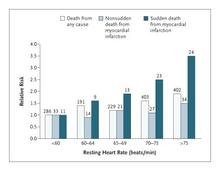A French study of 5713 men collected resting and exercise data on pulse rates from 1967 through 1972. They then followed up on deaths in that group through 1994 (about one-quarter died).
They found, among other things, that resting pulse rates predicted sudden death from heart attacks, though such sudden deaths were only a small proportion of total deaths.
The lowest risk was for those with pulse rates of less 60 beats a minute. Reading from Figure 1, pulses of 60-64 and 65-69 led to roughly 1.5-2 times the relative risk of sudden death by heart attack (compared to the low pulse group). Resting pulses of 70-75 led to roughly 2.5 times the relative risk, and pulses of greater than 75 led to roughly 3.5 times the risk of sudden death by heart attack. [Since the pulse groups were divided by quintiles, the median should probably have fallen in the midlle group with pulses of 65-69.]

(Click to enlarge.)
There is more in the article on the predictive power of exercise pulse rates.
For those who want an easy, painless way to check their blood pressure and pulse, you might consider a blood pressure wrist cuff. Everyone in our extended family has at least one of these Omron HEM 609 wrist blood pressure cuffs. [I’m having problems getting a good Amazon link. At Amazon search for: omron 609 hem jpi.] Just put it around your wrist, press one button, and wait a minute for the results. It slowly contracts and then suddenly releases when it gets its blood pressure reading, which results in no excess restriction and extremely little discomfort.
Comments are closed.